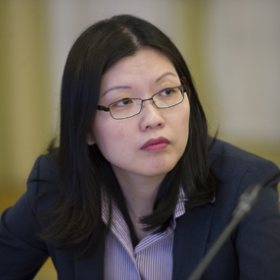
Piin-Fen Kok Speaks on U.S.-ASEAN Summit
Piin-Fen Kok, director of the EastWest Institute’s China, East Asia and United States Program, spoke with Channel NewsAsia’s First Look Asia program on the outcomes and joint statement (full text available here) from the U.S.-ASEAN Summit in Sunnylands, California. A summary of her responses to each interview question is given below.
This isn't the first such statement the U.S. and ASEAN have made on the South China Sea. Do you see China responding any differently this time around?
Kok identified three matters in the U.S.-ASEAN joint statement that she believes China may take issue with. First, the statement referred to freedom of navigation and overflight, which is an ongoing point of contention between China and the United States. Second, the statement mentioned non-militarization in South China Sea activities, which could be construed as admonishment towards China’s recent building of military facilities on reclaimed islands in the region. Third, the statement reaffirmed commitments to legal and diplomatic processes, with a specific reference to the United Nations Convention on the Law of the Seas. This reaffirmation comes in light of an impending legal decision by the International Court of Arbitration at The Hague adjudicating between the Philippines and China on the legality of China’s Nine-Dash Line. Kok believes these three elements of the U.S.-ASEAN joint statement may prompt a strong rebuke from China.
Is the statement a sign the U.S. intends to play a bigger role in securing freedom of navigation in the disputed waters?
Kok pointed out that, as U.S. President Barack Obama noted in his closing press conference, the United States will not be ceasing its freedom of navigation operations. Politically speaking, neither the United States nor China is in a position to ease their established positions on the South China Sea. The United States has asserted that freedom of navigation is a national interest, while territorial sovereignty and integrity is a core interest for China. Kok believes that the situation may be headed towards a so-called “stable stalemate” in which neither side can change the behavior of the other. The challenge under such circumstances will be to manage the situation in a way that prevents an escalation of tensions.
What about the war against extremism and Islamic State? With the recent attacks in Jakarta, what can ASEAN and the U.S. do to tackle the scourge of terrorism in the region?
Kok notes that Southeast Asia has always been a hotbed for the threat of terrorism and violent extremism. She also notes that the Islamic State is now not only a regional threat, but a global one that requires ASEAN and the United States to demonstrate the political will to work together as part of a coordinated global effort toward its eradication.
What other progress do you think was made at the U.S.-ASEAN Summit?
Kok highlighted the reaffirmation of ASEAN centrality and ASEAN-led mechanisms at the summit. The Obama administration has taken concrete steps to institutionalize the United States’ relationship with ASEAN as a key part of its “rebalance” to Asia. This will help sustain the U.S.-ASEAN partnership beyond the Obama presidency.

